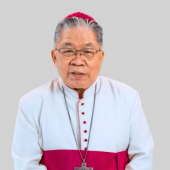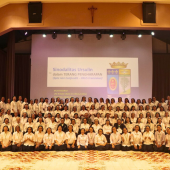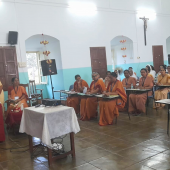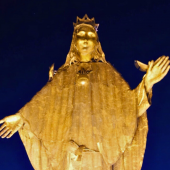Indonesian Religious in Rome Hold Leadership Handover, Celebrate Unity and Service
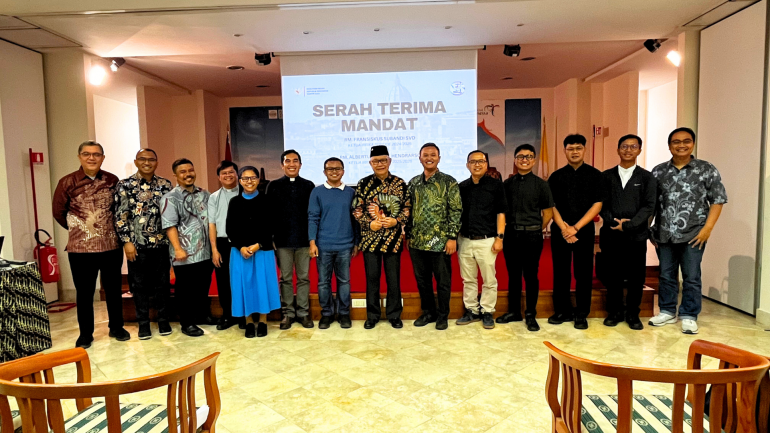
The Association of Indonesian Religious Men and Women in the Eternal City (Ikatan Rohaniwan Rohaniwati Indonesia di Kota Abadi – IRRIKA) held a leadership handover ceremony on October 25 at the Embassy of the Republic of Indonesia to the Holy See.
The event marked the conclusion of the 2024–2025 term and the beginning of a new chapter for 2025–2026, bringing together Indonesian priests, brothers, sisters, and representatives from both the Embassy to the Holy See and the Embassy of Indonesia to Italy.
The celebration was a moment of thanksgiving, fraternity, and renewed commitment to serving God, the Church, and the Indonesian community in Rome.
Outgoing chairperson Fr. Fransiskus Subandi, SVD, expressed gratitude for a year filled with collaboration and solidarity.
“The mandate we received has been both a blessing and a challenge,” he said, referring to the balance between academic, pastoral, and administrative responsibilities. “Yet the blessings far outweighed the difficulties.”
Fr. Subandi reported that IRRIKA managed a total of €7,500 in funds during the past year, with €3,122.32 handed over to the incoming leadership. He thanked IRRIKA partners such as REHAT, as well as community superiors and members, for their commitment to unity and mutual support.
He also acknowledged the vital role of both embassies in providing venues, logistical assistance, and financial support for community initiatives.
The handover ceremony concluded with the reading of the official statement and a fellowship meal symbolizing gratitude and solidarity.
A Community that Nurtures Joy and Communion
Founded in 1955, IRRIKA serves as a unifying platform for Indonesian priests, brothers, and sisters residing in Rome. It promotes pastoral collaboration, cultural exchange, and spiritual renewal while fostering fraternity among those living their missionary vocation far from home.
Describing IRRIKA as “an oasis of joy and communion,” the new chairperson Fr. Albertus Gatot Hendrasto said the organization plays an essential role in enriching the life of every Indonesian religious in Rome.
“Our main duty here is to study and to serve, but community life becomes richer through our encounters and friendships,” he shared.
Fr. Hendrasto recalled advice from his bishop before departing Rome, ‘Father, IRRIKA is important’, and emphasized that the community provides the “flavor” of missionary life abroad.
“Each gathering is more than a meeting, it is an encounter where we listen, share, and strengthen one another,” he added.
The new leadership team for 2025–2026, composed of priests and sisters from various dioceses and congregations, will continue IRIKA’s mission of fostering cultural-spiritual solidarity and collaboration among Indonesian religious in Italy.
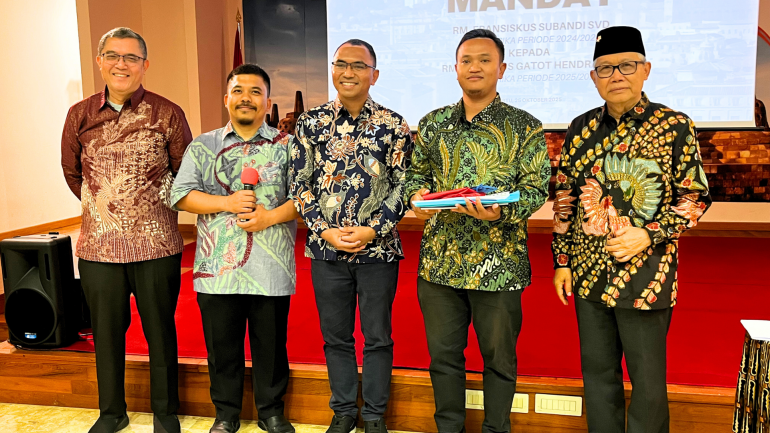
Strengthening Unity and Cultural Witness
The Ambassador of the Republic of Indonesia to the Holy See, Mr. Michael Trias Kuncahyono, commended IRRIKA as a vital platform for communication, collaboration, and mutual support among Indonesians in Rome.
“Through IRRIKA, we can stay connected, support one another, and maintain our sense of fraternity as children of the same nation, even while far from home,” he said, expressing admiration for the dedication of Indonesian priests, brothers, and sisters serving and studying across Italian dioceses.
The Ambassador also praised IRRIKA’s close partnership with the Indonesian Embassy in organizing national and cultural events, including the recent celebration of 70 years of diplomatic relations between Indonesia and the Holy See, which received warm appreciation from Vatican officials.
Looking ahead, he announced several upcoming joint initiatives, including a traditional Indonesian dance performance at the Vatican, an Angklung concert, and the launch of a commemorative stamp celebrating 70 years of diplomatic relations between Indonesia and the Holy See.
“These events showcase Indonesia’s culture, faith, and friendship with the Vatican,” he said. “Together, we bring pride to Indonesia and bear witness to harmony and faith at the heart of the Church.”
Building Communion Across Missions and Borders
In his reflection, Fr. Yulius Yasinto, SVD, representing REHAT, an acronym meaning “rest,” which refers to Indonesian priests and sisters serving in the generalates of religious congregations, highlighted IRRIKA's significance as a community where intercultural understanding and fraternity take root.
“Many of us come from different dioceses, congregations, and backgrounds,” he said. “Yet here in Rome, we meet, share, and build friendships that will bear fruit when we return to our respective missions.”
He thanked the Indonesian embassies for their consistent accompaniment and support, noting that such collaboration contributes to the Church’s mission and to the formation of future pastoral leaders.
“Through your encouragement, you strengthen the Church’s witness both in Indonesia and abroad,” he said.
Fr. Yasinto concluded by calling on members to continue supporting one another through prayer and service: “Let us remain united in faith so that our shared witness may bring light and hope wherever we are sent.”
A Living Sign of Fraternity
More than an association, IRRIKA continues to be a living sign of communion for Indonesian religious in Rome, a spiritual home where faith, culture, and friendship converge.
Its regular gatherings, recollections, and community initiatives not only strengthen bonds among members but also affirm their presence in Rome as part of the broader missionary journey of the Indonesian Church within the global Church.
As the new leadership takes office, IRRIKA renews its mission to be a beacon of unity, an “oasis of joy and communion”, for all Indonesian priests, brothers, and sisters living their vocation at the heart of the Church and at the crossroads of cultures.
(Kasmir Nema, an SVD missionary based in the Vatican, contributes regularly to RVA and other Catholic platforms and magazines.)
Radio Veritas Asia (RVA), a media platform of the Catholic Church, aims to share Christ. RVA started in 1969 as a continental Catholic radio station to serve Asian countries in their respective local language, thus earning the tag “the Voice of Asian Christianity.” Responding to the emerging context, RVA embraced media platforms to connect with the global Asian audience via its 21 language websites and various social media platforms.










